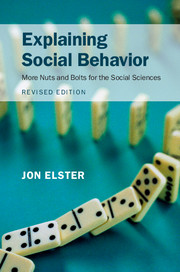7 - Beliefs
from II - The Mind
Published online by Cambridge University Press: 05 August 2015
Summary
In the present chapter I discuss the causal history of beliefs, postponing to Chapter 13 a discussion of the normative principles of belief formation.
What is it to “believe” something?
To understand the role of beliefs in generating action, we have to understand their nature, their causes, and their consequences. As I mentioned in the introductory remarks to Part II, it is not always clear what it means to “believe” that something is the case. Did the followers of Communism who “believed” that the party could do no wrong really believe it? How can we tell the difference between the congenital pessimist who tends to believe the worst and the prudent decision maker who merely acts as if the worst-case scenario were true? How can we tell the difference between risk aversion (a formal preference) and pessimism (a belief)?
Also, in everyday language “belief” suggests less than full endorsement. I believe it will rain tomorrow, but I also know I might be wrong. I do not merely believe that I am married; I know it. In philosophical analyses, knowledge is usually defined as justified true belief, a belief that stands in a particular relation both to the world (it is true) and to the body of evidence the agent possesses (it is justified). Yet neither of these features of knowledge captures the subjective certainty that often underlies the phrase “I know” in ordinary discourse. This certainty is not simply the limit of 97 percent probability, 98 percent, 99 percent, 99.9 percent, and so forth. It is qualitatively different from anything short of certainty.
This “certainty effect” shows up in the following experiment. One group of subjects was asked to express their preferences over various options. (Numbers in parentheses indicate the proportion of subjects preferring a given option.) A 50 percent chance to win a three-week tour of England, France, and Italy (22 percent).
- Type
- Chapter
- Information
- Explaining Social BehaviorMore Nuts and Bolts for the Social Sciences, pp. 114 - 137Publisher: Cambridge University PressPrint publication year: 2015



